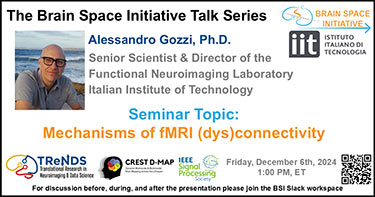Dec
06

Date: 6 December 2024
Time: 1:00 PM ET (New York Time)
Presenter(s): Dr. Alessandro Gozzi
Meeting information:
Meeting number: 2638 846 7463
Password: xnQp2DXqm84 (96772397 when dialing from a phone or video system)
Join by phone:
+1-415-655-0002 US Toll
Access code: 2638 846 7463
Join us Friday, 6 December 2024, at 1:00 PM ET for an exciting virtual talk by Dr. Alessandro Gozzi entitled: “Mechanisms of fMRI (dys)connectivity” as part of the activities of the Brain Space Initiative, co-sponsored by the Center for Translational Research in Neuroimaging and Data Science (TReNDS) and the Data Science Initiative, IEEE Signal Processing Society.
Abstract
Brain disorders are often associated with disrupted or atypical functional connectivity. However, our ability to decode these signals into interpretable biological or physiological mechanisms remains limited.
To fill this knowledge gap, my lab has pioneered methods to map and manipulate intrinsic fMRI connectivity in the mouse brain. In my talk I will illustrate recent examples of the use of this platform to probe the underpinnings of intrinsic fMRI connectivity, and its disruption in brain disorders. Specifically, I will show how cross-species fMRI can help parse signatures of brain dysfunction in autism into biologically distinct connectivity subtypes. I will then show how these subtypes can be linked to basic physiological mechanisms via the use of chemogenetic manipulations.
These findings contribute to our understanding of the general principles governing fMRI connectivity in the mammalian brain. Importantly, they also support a simple framework whereby fMRI hyper- and hypo-connectivity observed in brain disease counterintuitively reflects reduced and increased neocortical activity. Future extensions of this framework may offer opportunities to physiologically-decode fMRI dysconnectivity in human brain disorders.
Biography

Alessandro Gozzi, PhD, is a senior scientist and director of the functional neuroimaging laboratory at the Italian Institute of Technology, in Rovereto, Italy. The Gozzi lab focuses on the study of the functional organization of the mammalian brain at the macroscale. A major goal of Gozzi’s research is to unravel the neural basis and dynamic organization of large-scale functional connectivity as measured with fMRI, and the underpinnings of its disruption in developmental disorders like autism. The Gozzi lab addresses these questions via the combination of cutting-edge functional MRI mapping with genetic and neural manipulations in the living mouse brain. This approach has laid the foundations for a novel field of research in which large-scale neuroimaging readouts are used as probe of network activity and dysfunction across species.
Recommended Articles:
- Gutierrez-Barragan, D., Ramirez, J.S.B., Panzeri, S., Xu, T., and Gozzi, A. (2024). Evolutionarily conserved fMRI network dynamics in the mouse, macaque, and human brain. Nature Communications 15, 8518. (Link to Paper).
- Pagani, M., Gutierrez-Barragan, D., de Guzman, A.E., Xu, T., and Gozzi, A. (2023). Mapping and comparing fMRI connectivity networks across species. Commun Biol 6, 1238. (Link to Paper).
- Rocchi, F., Canella, C., Noei, S., Gutierrez-Barragan, D., Coletta, L., Galbusera, A., Stuefer, A., Vassanelli, S., Pasqualetti, M., Iurilli, G., et al. (2022). Increased fMRI connectivity upon chemogenetic inhibition of the mouse prefrontal cortex. Nat Commun 13, 1056. (Link to Paper).
- Pagani, M., Barsotti, N., Bertero, A., Trakoshis, S., Ulysse, L., Locarno, A., Miseviciute, I., De Felice, A., Canella, C., Supekar, K., et al. (2021). mTOR-related synaptic pathology causes autism spectrum disorder-associated functional hyperconnectivity. Nat Commun 12, 6084. (Link to Paper).
- Zerbi, V., Pagani, M., Markicevic, M., Matteoli, M., Pozzi, D., Fagiolini, M., Bozzi, Y., Galbusera, A., Scattoni, M.L., Provenzano, G., et al. (2021). Brain mapping across 16 autism mouse models reveals a spectrum of functional connectivity subtypes. Mol Psychiatry 26, 7610-7620. (Link to Paper).

